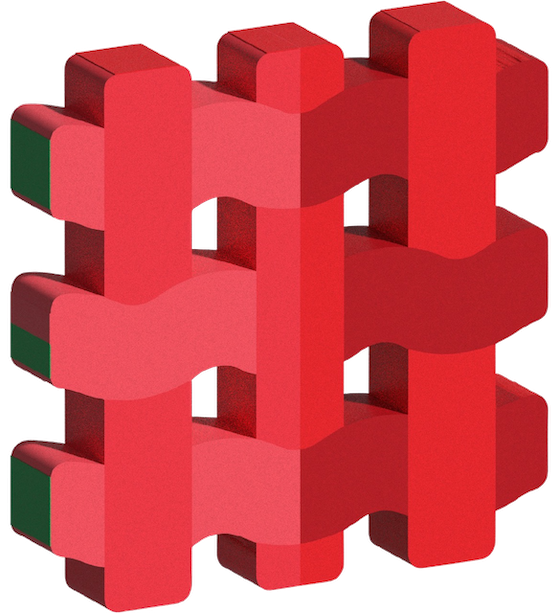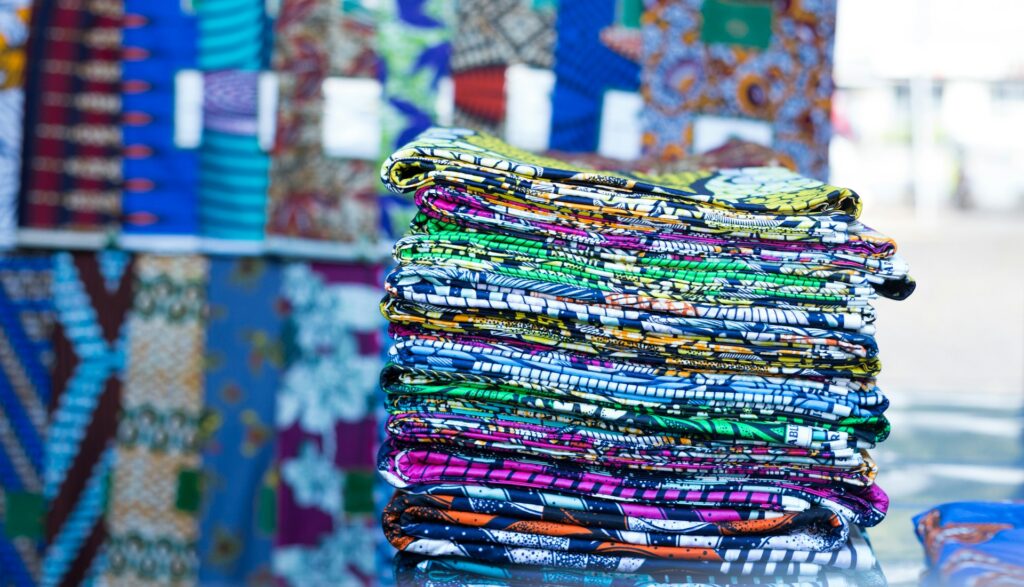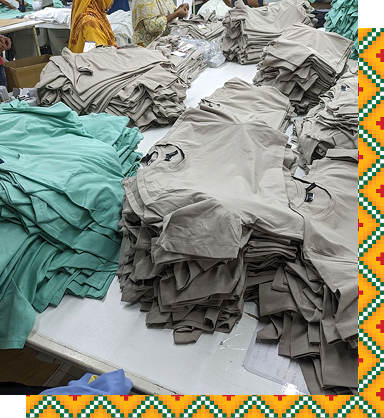Aligning with the Government of Ghana’s implementation of various industrialisation policies to bolster the sector, the Ghana Jobs and Economic Transformation Programme (JET), funded by the UK Government’s Foreign Commonwealth Office, strives to create systemic change in Ghana’s manufacturing sector.

Our Sector Focus
Automotive

Pharmaceuticals

Textiles & Garments
Our Approach
Ghana JET employs three strategic approaches to drive manufacturing transformation and economic growth.
Policy Development
Investment
Ecosystem
Results Based Grants
Results-Based Grants (RBGs) are cost-sharing mechanisms designed to drive transformative change through targeted support. Some successful grant applications include Ethical Apparel Africa (EAA), Atlantic Life Sciences (ALS) and WAHU Mobility.



About Ghana JET
Our Mission Statement

The Ghana Jobs and Economic Transformation Programme
In 2023, Ghana’s manufacturing sector contributed GH¢20.6 billion to the country’s Gross Domestic Product (GDP), representing 11.23% of the total GDP. It remains a key employer, providing jobs for approximately 21.5% of the workforce.

Driving Industrial Transformation
Aligning with the Government of Ghana’s implementation of various industrialisation policies to bolster the sector, the Ghana Jobs and Economic Transformation Programme (JET), funded by the UK Government’s Foreign Commonwealth Office, strives to create systemic change in Ghana’s manufacturing sector. The programme focuses on five priority sectors, including Pharmaceuticals, Textiles and Garments, and Automotive, fostering growth and innovation to accelerate Ghana’s economic transformation.
The JET programme empowers Ghana’s government, private sector, and ecosystem partners through demand-driven, evidence-based technical assistance, strategic stakeholder collaborations, and targeted results-based grants.
Led by local and international experts, it delivers contextually relevant support to leverage investment, facilitate technology transfers, and drive politically astute collaborations that enable impactful frontier shifts. These shifts will promote sustainable industrial growth, enhance competitiveness, and improve Ghanaians’ quality of life.


Our Approach
Policy Development
Investment
Ecosystem
Our Sector Focus
Pharmaceutical Sector
Ghana intends to become a fully integrated, competitive pharmaceutical hub, enhancing domestic health security and boosting regional exports with a diversified portfolio of advanced products, including biopharmaceuticals, vaccines, sera, and Active Pharmaceutical Ingredients (APIs).
Projections for Ghana’s pharmaceutical market suggest a value of $600m, with a compound annual growth rate of 4%. Yet only thirty-four pharmaceutical manufacturing plants operate locally, fulfilling only 30% of Ghana’s medicinal needs while exporting to the ECOWAS region. This data highlights the boundless opportunities for investors to venture into pharmaceutical manufacturing in Ghana.

Textiles and Garments
Automotive
A strong local automotive industry is key to economic growth, job creation, and industrial innovation. By boosting local vehicle assembly, Ghana can increase demand for domestically assembled vehicles, enhance production capacities, and attract investment into the sector. This will not only strengthen the local automotive ecosystem but also create sustainable employment opportunities.
Sector: Pharma
Ghana aims to become a fully integrated, competitive pharmaceutical hub, enhancing domestic health security and boosting regional exports with a diversified portfolio of advanced products, including biopharmaceuticals, vaccines, sera, and Active Pharmaceutical Ingredients (APIs).
Ghana’s pharmaceutical market is projected to be about $600m, with a compound annual growth rate of 4% (2024 –2028), reaching $735m by 2028 (Fitch Solutions, 2024). Ghana’s healthcare system relies heavily on the importation of essential medicinal products. Only thirty-four pharmaceutical manufacturing plants operate locally, fulfilling only 30% of Ghana’s medicinal needs while exporting to the ECOWAS region. This highlights the boundless opportunities for investors to venture into pharmaceutical manufacturing in Ghana.
Strategic Importance
Given the material market size, existing starting point, and potential to create 4,000–6,000 high-quality jobs Ghana has a compelling opportunity to invest in pharmaceuticals.
Ghana already possesses pharmaceutical capabilities and a track record of exports into the West African region. The opportunity in this regional market is material and growing, projected to rise from $7 billion today to $11 billion by 2028 (Fitch Solution, 2024). Moreover, sector growth will enhance skills and deepen economic complexity.
This long-term initiative requires concerted investment and learning from global examples like Ireland and India. These hubs demonstrate that it takes decades (up to 50 years) to strengthen pharmaceutical ecosystems and evolve into fully integrated hubs.
Local and Global Context
The pharmaceutical manufacturing industry in Ghana started in the 1960s with basic pre-packaging of imported drugs and has evolved to manufacture oral liquids, capsules, sera, and injectables. However, the sector primarily focuses on formulation manufacturing, leaving significant portions of the value chain untapped.
The Ghanaian pharmaceutical sector faces challenges in scaling operations and addressing inefficiencies but holds significant potential due to local market size and growth in the ECOWAS region.
Globally, the industry is shifting toward advanced therapies and near-shoring, providing opportunities for Ghana to develop its manufacturing capabilities.
Ghana’s regulatory framework is strong: The Food and Drugs Authority (FDA) has WHO Maturity Level 3 certification (one of only five African countries).

Global Trends in the Pharmaceutical Sector
The global pharmaceutical sector is projected to reach $2 trillion by 2028 (Global Use of Medicines, 2024), driven by the rise of high-value drugs, including biologics and other advanced therapies, mainly in developed markets. The near-shoring trend has strengthened as manufacturers seek to improve supply chain resilience, and countries prioritise nearshore production for national security.
Expiry of patent exclusivity is expected to unlock a further $81B in the generics market in the next four years – 70% of this will relate to small molecules patents” (Evaluate Pharma).
Regional market focus and cost-efficient distribution are critical for success. Manufacturers with strengths in core “right-to-win” dimensions are best positioned to succeed. As a drug manufacturer, Ghana has the right to play in local and ECOWAS markets but does not yet have the right to win.
Regional Trends
West Africa’s regional pharmaceutical market is expected to grow significantly, presenting opportunities for Ghana. However, Ghana’s local and regional market volumes are fragmented due to thirty-five active producers with low plant utilisation levels. Sub-scale operations limit cost efficiency and quality standards. Most local producers struggle to compete with regional players and imports from India and other global hubs due to higher operating costs and inefficient sourcing practices.
Opportunities
Active Pharmaceutical Ingredients (APIs)
Medical Consumables
Oral Dosage Forms
Vaccine Production
Institutional Support
Pharmaceutical Ecosystem Development
Government Measures

Exemption Act 2022 (Act 1083)

Incentives for Investment

Regulatory Strength
Sector: Textiles and Garments
Strategic Importance
Local and Global Context

Global Trends in the Pharmaceutical Sector
The global pharmaceutical sector is projected to reach $2 trillion by 2028 (Global Use of Medicines, 2024), driven by the rise of high-value drugs, including biologics and other advanced therapies, mainly in developed markets. The near-shoring trend has strengthened as manufacturers seek to improve supply chain resilience, and countries prioritise nearshore production for national security.
Expiry of patent exclusivity is expected to unlock a further $81B in the generics market in the next four years – 70% of this will relate to small molecules patents” (Evaluate Pharma).
Regional market focus and cost-efficient distribution are critical for success. Manufacturers with strengths in core “right-to-win” dimensions are best positioned to succeed. As a drug manufacturer, Ghana has the right to play in local and ECOWAS markets but does not yet have the right to win.
Regional Trends
Ghana also benefits from initiatives like the ‘Partenariat pour le Coton’, launched by the World Trade Organisation and partners to develop the T&G industry in West Africa. The International Finance Corporation (IFC) approved $8 million in funding for a large garment manufacturing facility in Greater Accra in 2022, supporting Ghana’s ambition to become a regional T&G hub. DTRT Apparel Group, the largest garment manufacturer in West Africa, employs over 5,000 workers and aims to create an additional 6,000 jobs.
Opportunities for Investmnent
Industrial Textile Parks
Modernising Textile Mills
Sustainable Industries
Accessory Manufacturing
Establish factories for basic, decorative, and finishing garment accessories like zippers, buttons, and labels.
Textile Recycling
Government Measures

Preferential Trade Agreements
Duty-free exports under agreements like AGOA (U.S.), EPA (EU), and ECOWAS protocols.

Investment Incentives

Regulatory Strength
Sector: Auto
Strategic Importance
The automotive industry offers a vital pathway to economic diversification. Ghana can reduce its reliance on imports by establishing local manufacturing capabilities and bolstering its GDP through industrial growth. This diversification is critical to building a more resilient and self-reliant economy, ensuring sustainable progress despite global economic shifts.
Local and Global Context


Global Trends in the Pharmaceutical Sector
Regional Trends
Opportunities
Import Substitution
Developing local assembly and manufacturing can replace imports, especially given the high tariffs on used vehicles
Aftermarket Components
Electric and Hybrid Vehicles
Skills Development
Investments in training programs can improve workforce quality, making Ghana more competitive.
Export Potential
With adequate scale and compliance with trade agreements, Ghana could export vehicles and components to ECOWAS and beyond.
Collaborations with OEMs
Strengthening partnerships with Original Equipment Manufacturers (OEMs) can bring investment and technology transfer.
Government Measures

Ghana Automotive Development Policy (GADP)
- Offers tax exemptions and incentives for SKD and CKD assemblies.
- Imposes tariffs on used car imports to encourage new vehicle purchases.
- Supports local assemblers through reduced costs for components.

AfCFTA

Other Preferential Trade Agreements

After care

Capacity Building Initiatives
Results Based Grants
Examples of successful grant applications include:
Ethical Apparel
Strategic Implementation
Leveraging the programme’s RBGs, EAA successfully embedded an international lean consultant into Maagrace and other SMEs’ technical capabilities to secure additional orders and expand Ghana’s footprint in high-value export markets. The initiative will be scaled sustainably through a train-the-trainer model, embedding expert knowledge in each factory and ensuring long-term industrial competency.
Impact and Future Vision
Integrating an international lean consultant into Maagrace and partner SME factories has already yielded efficiency improvements, as identified through milestone monitoring. This intervention addresses Ghana’s systemic constraint—the lack of industrial engineering expertise—by embedding technical capabilities that enhance production quality, reduce waste, and improve turnaround times. Though still in progress, these efficiency gains lay the foundation for a sector-wide frontier shift, transitioning Ghana’s garment manufacturing from low-margin, dependency-driven exports to a self-sustaining, globally competitive industry.
